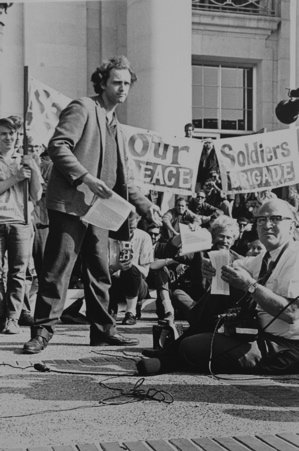|
Craig White's authors |
 |
Mario Savio (1942-96) |
 |
Mario Savio, leader of Free Speech Movement at Berkeley, California, 1964.
From obituary: "Mario Savio, Protest Leader Who Set a Style, Dies at 53," New York Times 8 Nov. 1996, C21.
. . . Mr. Savio is remembered for the words he spoke on Dec. 2, 1964, from Sproul Plaza in front of Berkeley's main administration building, to a large crowd of protesters, many of whom took part in a sit-in inside the building and a campus strike.
"There is a time," he said, "when the operation of the machine becomes so odious, makes you so sick at heart, that you can't take part; and you've got to put your bodies upon the gears and upon the wheels, upon the levers, upon all the apparatus and make it stop. And you've got to indicate to the people who run it, to the people who own it, that unless you're free, the machine will be prevented from working at all."
The police arrested 800 of the protesters in what was the largest mass arrest in California history.
The sit-in was the climax of three months of student disorders in reaction to the university's decision to limit the activities of civil rights and political groups on the campus. Students contended that the restrictions abridged their constitutional rights. . . .
At a news conference after the Dec. 2 action, Mr. Savio said it had been the most successful student strike in American history, with only 17 per cent or 18 percent fo the students attending classes.
After a demonstration two months earlier, Mr. Savio was accused of biting a police officer's left thigh,, "breaking the skin and causing bruises." . . . Mr. Savio . . . apologized afterward to the officer because, as he put it, they were "both working-class kids."
Wendy Lasser, "Speech with the Weight of Literature," New York Times Book Review, 15 Dec. 1996, 43.
[Mario Savio] brought an innocence to the world—a pure, ingenuous, trusting sense of righteousness and compassion—that the world was ill equipped to handle. Sometimes, even before he died, I would think of him as a sainted Dostoyevskyan fool, like Prince Myshkin in "The Idiot." . . . He did not set out to be a martyr, certainly, but he was willing to lose in the name of justice; there were more important things to him than winning. "We are moving right now in a direction which one could call creeping barbarism," he said in 1994. "But if we do not have the benefit of the belief that in the end we will win, then we have to be prepared on the basis of our moral insight to struggle even if we do not know that we are going to win."
He was gentle, even to those who behaved brutally, and he was decent, even when he was angry. In 1964, when he clambered up on a police car to protest the arrest of a fellow student, he took off his shoes first so he wouldn't damage the car.
